Text Sarah Ahmed
Port is so emblematic of Portugal that it’s hard to believe that Poças Junior one of only a handful of Port Houses which has remained in the same family (and for that matter, Portuguese ownership) since it was founded nearly a century ago by Manuel Domingues Poças Junior. When I met with Chief Viticulturist Maria Manuel Poças Maia, she left me in no doubt that her generation – the fourth – are absolutely determined to keep it that way.
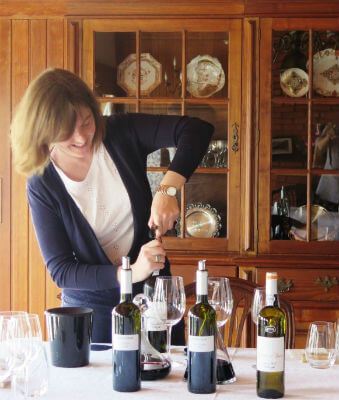
The new era uncorked by industrious Chief Viticulturist Port Maria Manuel Poças Maia of Poças Junior – Photo by Sarah Ahmed | All Rights Reserved
Which is not to say that they are stick in the muds. Far from it. I hadn’t realised until my visit earlier this month that Poças was among the first wave of Port producers to embrace Douro (table) wine at the outset of the modern era in 1990. The trigger? Maia’s cousin, Chief Winemaker Jorge Manuel Pintão, had just joined the business fresh from his oenology degree in Bordeaux and an internship at Château Giscours in this famous French region. She explained, “he wanted to make here what he had learned in Bordeaux and knew that the Douro had potential for good dry wines.”
Of course Pintão was not the first Douro winemaker to take inspiration from Bordeaux. Fernando Nicolau de Almeida, creator of Barca Velha, claims that distinction. But thanks to Pintão’s continuing relationship with the prestigious French region (Maia says “he never lost contact with Bordeaux”), Poças has now gone a step further. Last year, the company secured the services of Bordeaux winemaker and consultant Hubert de Boüard de Laforest, owner of the acclaimed Château Angélus, in Saint-Emilion. Together with Philippe Nunes of Hubert Boüard Consulting (who, coincidentally, is of Portuguese parentage) the Bordelais duo helped craft Poças’ 2014 Douro wines.
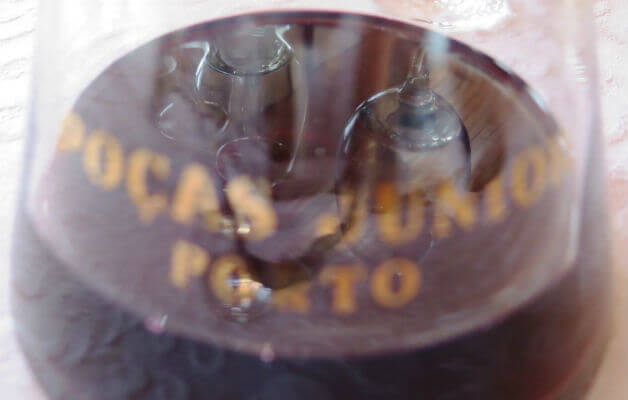
Time for reflection at Poças – Photo by Sarah Ahmed | All Rights Reserved
With 25 years under its belt, Poças is among the Douro’s most experienced Douro wine producers. I asked Maia why the family felt the need to hire a consultant. Her reply is candid – “nowadays, the market is difficult and we wanted to expand our markets for table wine. We are growing in terms of Port but want to see the same growth in Douro wines which are starting to be very known, but still need to be more known by people.” In other words it’s not just about “someone from outside the company giving us new ideas to have an evolution,” but also about the profile which Hubert Boüard Consulting brings. As she freely admits, “being from France, the status is important….Our work with Bordeaux is adding value in bottle of course, but in perception too.”
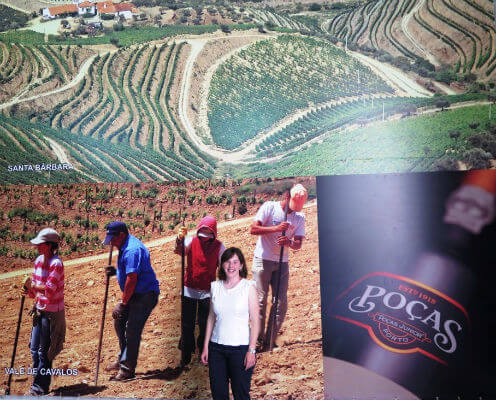
Maria Manuel Poças Maia of Poças Junior against a backdrop of Quinta Santa Barbara – Photo by Sarah Ahmed | All Rights Reserved
Still, Maia is quick to emphasise “they [Hubert Boüard Consulting] are helping us to grow our image of wines and styles, but always without forgetting that we want to use Portuguese varieties and keep the heritage of our grapes and terroir.” The family were delighted that, given the consultancy’s experience of wines from around the world, “there is huge respect for what they found here in the Douro.” If, before coming, Maia thought Boüard had “a bit of doubt” about the old vineyards, it was dispelled when he first visited Santa Barbara [Poças’ vineyard in Caêdo, the Cima Corgo] and saw the old vines and schist. Glowing with pride the viticulturist who, at the tender age of 23, assumed responsibility for the family’s three quintas in 2005 reports, “he said ‘this is terroir’ and was really convinced he could do a very good wine.”
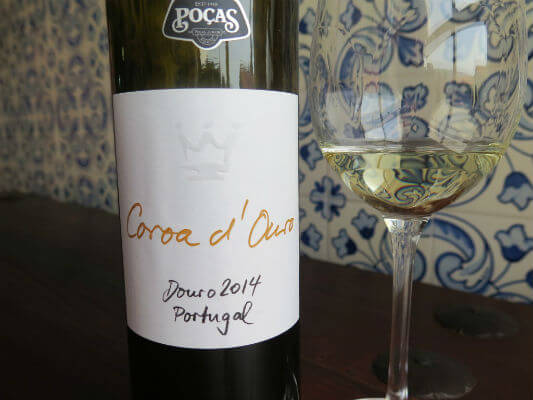
New, improved Douro white Poças Coroa d’Ouro 2014 – Photo by Sarah Ahmed | All Rights Reserved
Before I tasted samples of the new, improved 2014 wines (none yet released, the reds unfinished), we discussed what changes have been introduced following the appointment of Hubert Boüard Consulting. Describing them as “slight refinements,” Maia explained that the overall aim was “to make a more international style – a lighter perception of Douro wines because Douro wines are seen as very tannic, very strong and difficult to drink.” In the vineyard this pursuit of elegance, especially more refined tannins, has involved tweaks to fruit sourcing. Grapes now come from riper parcels and Boüard has introduced a younger vine (15 year old) Touriga Nacional component to the predominantly old field blend flagship red Simbolo.
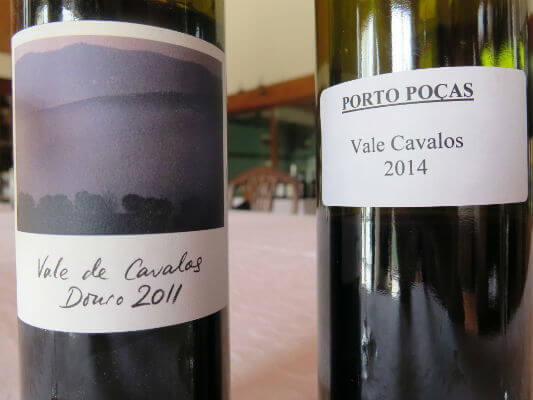
In with the new, out with the old – Poças Vale de Cavalos 2014 – Photo by Sarah Ahmed | All Rights Reserved
In the winery, changes have included different press settings (for the unoaked white) and different yeast and oak selections. The reds are no longer aged in a combination of American and French oak. From 2014 they were aged in 100% French oak barriques using different coopers or the same cooper as before but different woods. Where the Bordelais are renowned for their blending skills, the premium wines are now made in a new location with more space “to have opportunity to try several [blending] options.”
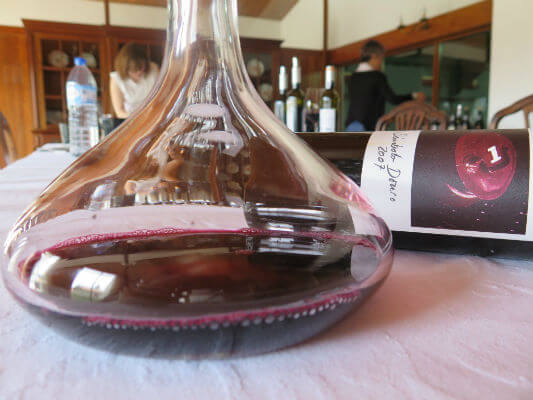
Great potential, flagship red Poças Simbolo 2014 – Photo by Sarah Ahmed | All Rights Reserved
Obviously, it is very early days to reach any definitive conclusions about this Douro/Bordelais relationship, or the 2014 wines. However, having compared Poças Coroa d’Ouro white and unfinished (barrel) samples of both reds Vale de Cavalos and Simbolo with earlier vintages (the 2013, 2011 and 2007 respectively), I suspect Poças will not only be celebrating their centenary in 2018 but also a sound return on their investment. Despite their youth, all three wines displayed greater refinement to the finish; the improved length of the white and tannin quality of the reds was especially striking. The 2007 Simbolo tasted fully mature and more developed than expected; rather drying tannins were already starting to out-pace the fruit. On the other hand, Simbolo 2014 impressed with its fine, fluent tannins. The sample I tasted was vibrant, perfumed, and mineral with a very long, elegant finish. Showing great potential, I reckon it will deliver more pleasure and for longer than the 2007. It’s a testament to the winemaking when 2007 was a highly acclaimed (classic vintage Port) year and 2014 was much trickier, with intermittent rainfall at harvest. I look forward to tasting the finished article.
While, with a touch of je sais [Hubert Boüard Consulting] quoi Poças’ range of 2014 Douro wines may be new, improved and higher profile, some things don’t change. I’m told Poças intend to maintain the family’s tradition of focusing on a good relationship between cost and value (the current release of Simbolo retails for £30-35/bottle). As Maia puts it, “we are about quality not quantity but without having unreachable prices.” I’ll drink to that!
Contacts
Manoel D. Poças Junior – Vinhos, S.A
Rua Visconde das Devesas 186
4401 – 337 Vila Nova de Gaia
Portugal
Tel.: (+ 351) 223 771 070
Website: www.pocas.pt




Leave a Reply